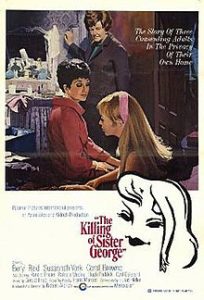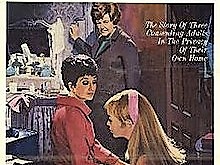The Killing of Sister George **** (1968, Beryl Reid, Susannah York, Coral Browne) – Classic Movie Review 6553
Director Robert Aldrich’s dark-toned 1969 lesbian drama features a splendid, career-best performance by Beryl Reid as June ‘George’ Buckridge, the ageing, bad-tempered, drunken lesbian actress whose imminent demise in a radio serial makes life hell for her and everyone around her. Lesbian drama it may be, but the word ‘lesbian’ is mentioned only once, about 100 minutes into the 138- minute film.
Deservedly recreating her venomous stage role, Reid’s marvellous performance is at the heart of Aldrich’s version of Frank Marcus’s theatre hit. George is a great character, a gin-swigging, cigar-chomping, sadistic masculine woman, the opposite of the sweet character she plays on radio. Reid brings her to vivid life, both pathetic and sympathetic.
The Killing of Sister George premiered at the Bristol Old Vic in April 1965, directed by Val May. It toured and opened on 17 June 1965 at the Duke of York’s Theatre in London, with the original cast including Reid as June Buckridge.
The original Broadway production opened at the Belasco Theater in New York on 5 October 1966, ran for 205 performances and was nominated for the 1967 Tony Award for the Best Play. Reid won the 1967 Tony Award for Best Actress in a Play.
But almost equally fine are Susannah York as her childish young girlfriend, Alice ‘Childie’ McNaught, and the much-missed late Coral Browne as Mercy Croft, the predatory BBC lady who starts an affair with her. Much missed? Well so of course are Beryl Reid and Susannah York.
Aldrich has been accused of coarsening and commercialising a subtle play. But, nevertheless, it is a spirited, highly entertaining, even sometimes enlightening, possibly even liberating movie, pulling lesbians out of the closet.
Aldrich’s extended, supposedly shocking nude scene of lesbian love was enough to prevent the film from getting a BBFC certificate at the time, with local councils having to grant certificates for its release. It is ironic that at this era of broadening freedoms, The Killing of Sister George would be effectively banned by the BBFC.
Of course, it is a film of its now long-ago time, but not too many allowances have to be made for its dated attitudes. However, admittedly there is an argument that men shouldn’t be writing and making plays and films about lesbians.
The opening out of the play for a movie provides roles for a considerable cast, who include Roland Fraser, Patricia Medina, Hugh Paddick, Cyril Delevanti, Sivi Aberg, William Beckley, Elaine Church, Brendan Dillon, Mike Freeman, Maggie Paige, Jack Raine, Dolly Taylor, Meier Tzelniker, Byron Webster, Cicely Walper and Rosalie Williams.
The screenplay is by Lukas Heller, it is shot by Joseph F Biroc, produced by Edgar J Scherick, Robert Aldrich and Walter Blake, scored by Gerald Fried and designed by William Glasgow.
Marketed as a ‘shocking drama’, the adults only film adds explicit lesbian content not in the original play, and was presented as a serious treatment of lesbianism.
Surprisingly, Aldrich regarded it as his favourite of his films. Angela Lansbury turned down the part of June Buckridge and Bette Davis battled to get the role. Julie Christie turned down the part of Childie.
The scene in the lesbian bar was filmed in the Gateways Club in London, creating. controversy. All locations were filmed in London but the interiors were filmed in the studio in Los Angeles.
Miriam Margolyes played the star role on stage in London in a 1995 revival, and in 2011 a revival at London’s Arts Theatre featured Meera Syal as George.
Marcus’s play was inspired by a controversial incident in 1963 when the BBC sacked a beloved radio star and was replaced by Jessie Matthews. The radio soap Mrs Dale’s Diary had been running since 5 January 1948 when the BBC decided to replace the lead actors and move the setting to a new town, with new supporting characters. The actress who had played Mrs Dale for 15 years, Ellis Powell, never recovered from this blow and died three months later, at the age of 57, through the shock and distress of her summary dismissal by the BBC.
Marcus mixes Powell’s story with a parody of the BBC’s killing off of the Grace Archer character in The Archers, another famous BBC radio soap.
© Derek Winnert 2018 Classic Movie Review 6553
Check out more reviews on http://derekwinnert.com



